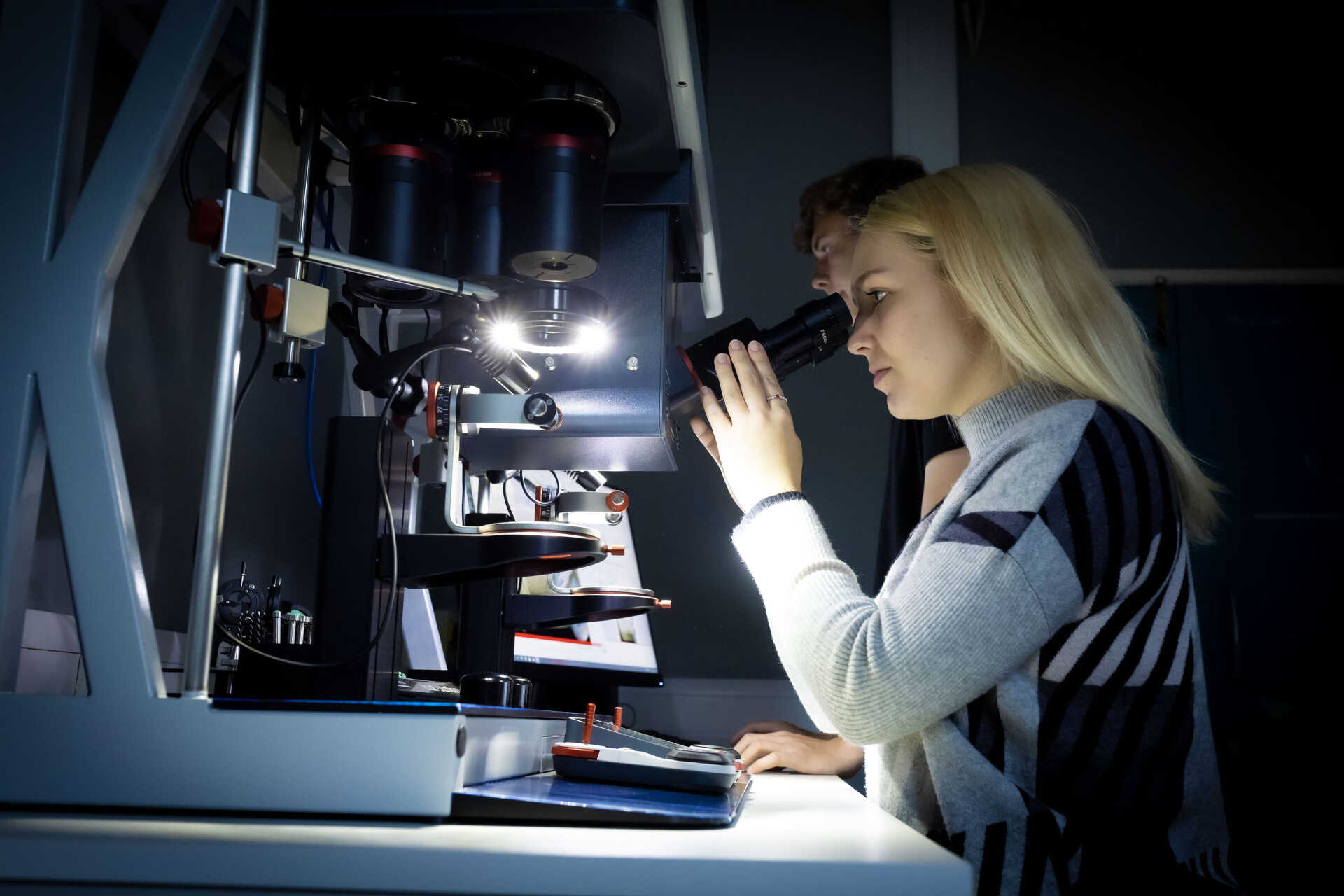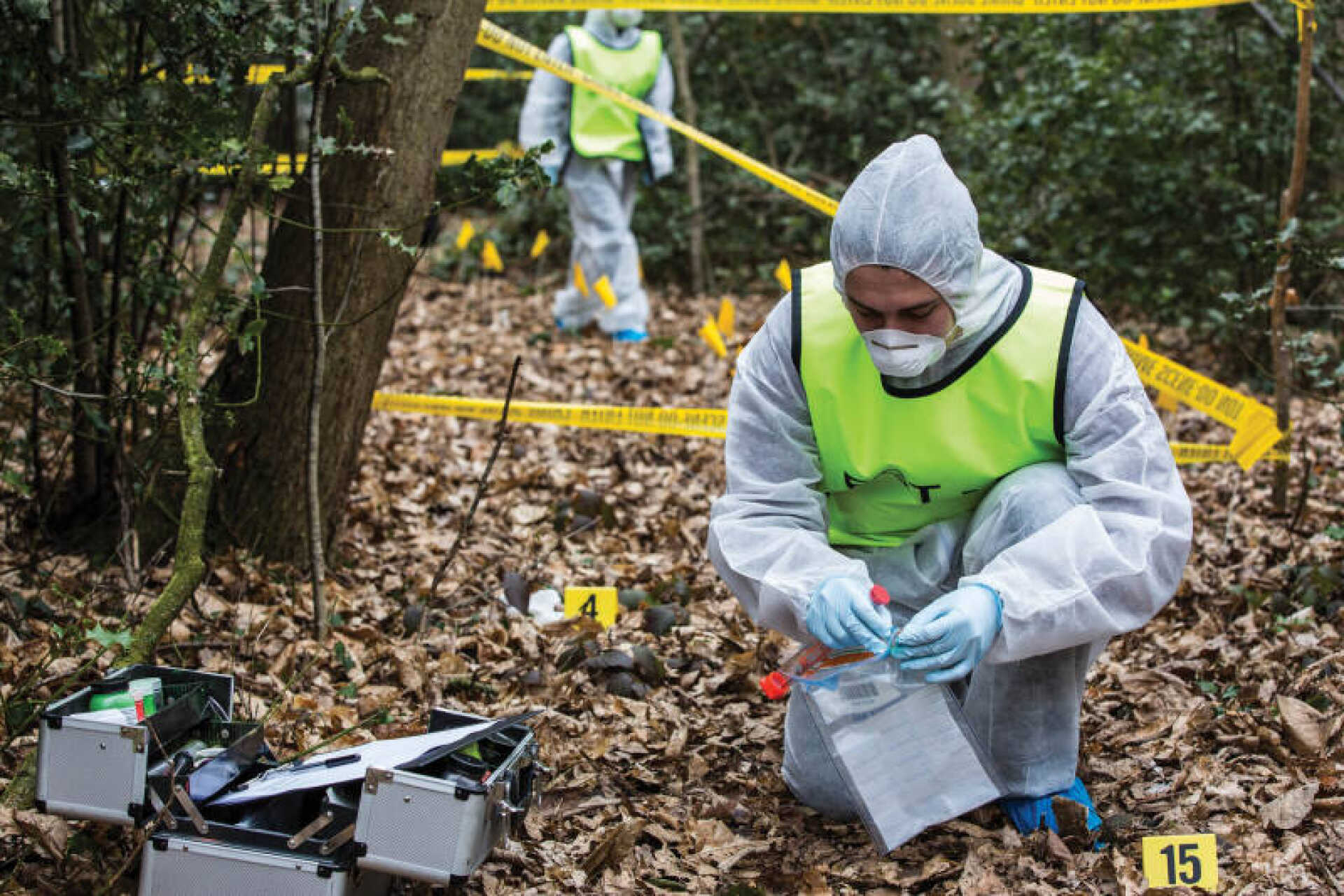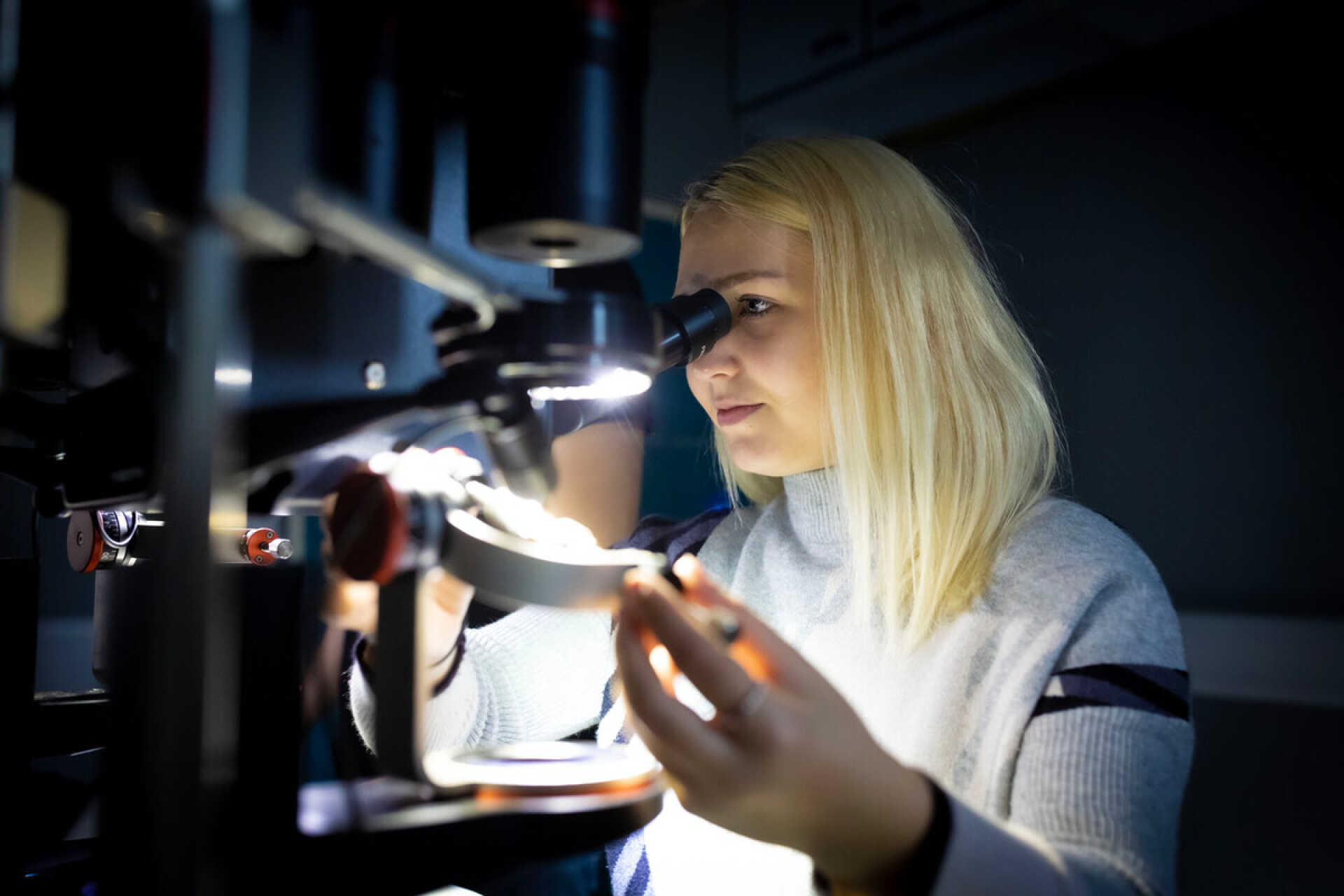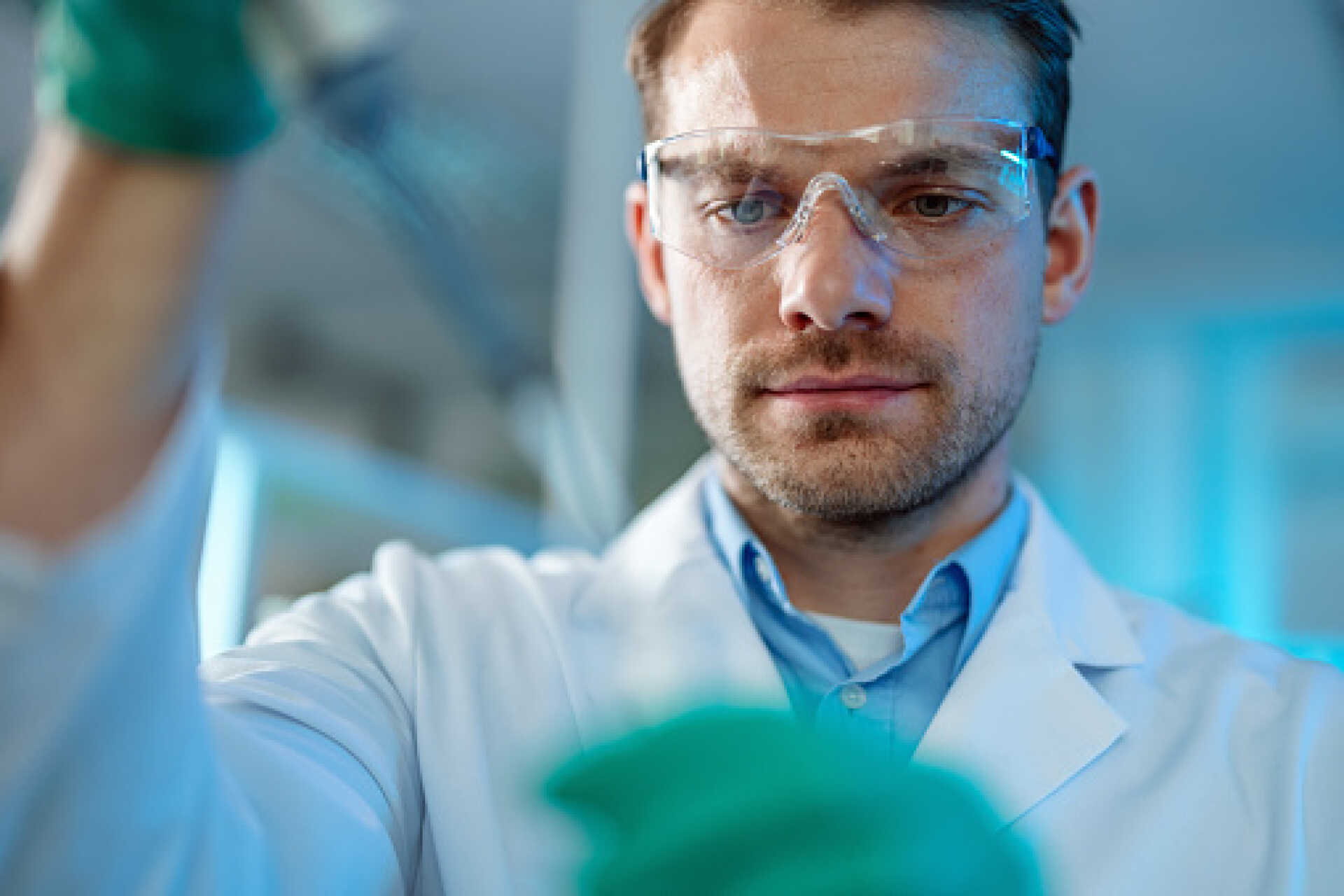Forensic Science
with a Foundation Year
Unlock the secrets of crime-solving and gain the skills for a rewarding career.

Unlock the secrets of crime-solving and gain the skills for a rewarding career.
Do you want to understand the science behind crime scene investigation, develop your laboratory skills and be trained in the delivery of expert witness testimony? Then choose our top-ranked Forensic Science degree.
This programme is designed for students who do not meet the requirements for direct entry to Stage 1 of our degree courses, and is an excellent conversion course for applicants who have shown academic ability in non-science subjects.
You'll graduate with in-depth knowledge of the theory behind the science, supported by practical experience gained in simulated crime scenes and court cases, major incident exercises that unfold in real time and in our outstanding laboratories. You'll also discover how the skills you gain can be applied within archaeology and in the food and pharmaceutical industries.
This course is fully accredited by The Chartered Society of Forensic Science.

Your Forensic Science degree opens the door to lots of exciting careers; taking a professional placement year helps you discover some of those options.
We're ranked 1st in The Guardian University Guide 2024 and 3rd in The Complete University Guide 2024.

Forensic Science student Luke Ryde has spent a lifetime planning his career path, discover why Kent was part of his plan.
Academic advisers and support staff are on hand to help with course and life queries; careers advisers to help you get where you want to go.

You'll use industry-standard equipment from the start of your degree.
Our typical offer levels are listed below and include indicative contextual offers. If you hold alternative qualifications just get in touch and we'll be glad to discuss these with you.
For those with a relevant science qualification our standard offer is CDD with one of these to be a Science subject, for those without a relevant science qualification our standard offer is BB, OR CCC including at least two subjects from the following areas: humanities, computing, art and design, English language or literature.
A typical offer would be MMP in Applied Science, Biomedical Science, Medical Science, Forensic and Criminal Investigation, Sport or Sports Coaching. All other subjects are considered on a case by case basis.
80 tariff points - typically H5, H4, H4 including HL Science Subject, Sport, Psychology or Maths at 4 or SL Science Subject, Sport, Psychology or Maths at 6.
N/A
Pass overall in Science with C or more in the core components.
The University welcomes applications from Access to Higher Education Diploma candidates for consideration. A typical offer would be to obtain Access to HE Diploma with 45 level 3 credits, including at least 6 at Distinction, 18 at Merit and 21 at Pass. This will then be reviewed by the School.
We consider all applications on an individual basis during Clearing and you're encouraged to get in touch to discuss your grades. You're most likely to be offered a place in Clearing for this course if you hold the following subjects:
The following modules are offered to our current students. This listing is based on the current curriculum and may change year to year in response to new curriculum developments and innovation:
This module will introduce students to the fundamental components of life. Students will be introduced to the function of key cellular components and their organisation in prokaryotic and eukaryotic cells. Through the study of cellular processes, students will develop an appreciation and understanding of the key biological processes underpinning living organisms.
This module will cover chemical concepts and principles. Through lectures and workshops, student will learn about atoms and states of matter, valence and bonding, basic chemical reactions, molecular shapes and isomerism, writing chemical equations and thermodynamics. The application of these principles in chemistry, forensic science, biological and exercise science will be explored in workshops, illustrating their fundamental importance in the natural sciences.
This module will provide a fundamental academic framework the support students in the study of Natural Sciences. The curriculum will address the study of science in a higher education environment and support students in the transition to university. Within the context of the Natural Science subjects, students will undertake laboratory investigations, developing skills and confidence in experimental work. Student will also learn how to find and evaluate information relevant to scientific investigation and use key software packages and databases to do so. The module will provide training in the use of mathematics to develop skills and confidence in numeracy, mathematical and statistical evaluation and graphical presentation of quantitative information.
This module draws together different strands of biological, chemical, physiological and human sciences to explore how scientific investigations can address major global challenges. Practical experimental work involving equipment used in research investigations, creative and critical thinking workshops, and guided group work will explore the role of the natural sciences in addressing some of the UN Sustainable Development Goals. The module will provide insight into the degree pathways available after completion of the foundation year.
This module will build upon fundamental biological principles and processes and place them in the context of key human physiological systems. The function of human tissues will be explained and discussed. The module will explore key principles of genetic inheritance and the drivers of genetic variation. These key areas will provide the foundations for exploring homeostasis in humans, the maintenance of health and the onset of disease.
This module will introduce students to the scientific applications of fundamental sport and exercise sciences topics. This will include anatomy and physiology, as applied to sport, exercise and physical activity; the musculoskeletal system; biomechanics of human movements; psychology in sport and exercise; and how physical fitness, or components of fitness, are assessed in an objective and scientific way.
This module will cover chemical concepts and principles. Through lectures and workshops, student will learn about how chemical reactions occur and the fundamentals and uses of common transformations. This will be accompanied by an introduction to the methods by which these can be studied. The application of these concepts and techniques in chemistry, forensic science, biological and exercise science will be explored in workshops, illustrating their fundamental importance in the natural sciences.
This module presents a unified understanding of the structure of matter, linking physical properties to bonding and energy, and providing the tools necessary to begin to describe and analyse chemical problems. Key concepts such as mass balance and bonding (ionic, covalent, metallic, and intermolecular) are linked to analytical methods to show how these fundamental ideas can be measured and used.
Organic chemistry underpins not only much of the chemistry of living things but also modern materials, dyes, medicines, and more. This module discusses the structure of organic molecules in detail, showing the shape of molecules dictates their properties, and how Nuclear Magnetic Resonance spectroscopy (NMR) can exploit this to determine the structures and thus properties of unknown molecules. Fundamental modes of reactivity of organic molecules are discussed, showing how simple mechanisms can be used to build complex and useful compounds.
An introduction to the core Mathematical skills required within the Chemical and Forensic Sciences. These core skills will be complemented with a variety of problem-solving applications in Chemistry and Forensic Science.
Chemistry, as one of the physical sciences, is rooted in careful observation of the natural world and experimentation. This module teaches the key skills required to work in a chemical laboratory, analysing unknown systems and synthesising new ones, and learning how to apply the theories and ideas from lecture modules to socially and industrially relevant problems.
One-on-one meetings and small group tutorials focused on academic progression and the development of key skills to support the core curriculum and future study or employment. Students meet with their Academic Advisor individually or in small groups at intervals during the academic year. Individual meetings review academic progress, support career planning etc. Themed tutorials develop transferable skills; indicative topics are essay and report writing, presentation skills, sourcing information, critical analysis etc. The tutorials are informal involving student activity and discussion. Year group events deliver general information e.g. on University resources, 4-year programmes, module selection etc.
In this module students will experience a broad overview of evidence categories and crime types commonly encountered within the criminal justice system. Students will also be taken through a range of techniques associated with the delivery of forensic science to support this system.
This module introduces a range of forensically-relevant practical techniques from the initial processing of incident or crime scenes through to carrying out relevant laboratory analyses of evidence collected.
This module will provide forensic science students with some of the core understanding in inorganic and physical chemistry. These aspects will underpin students' understanding of Analytical Techniques and the Chemistry related to various forensic processes, leading to an enhanced understanding of Forensic Chemistry.
This module introduces students to the mathematical, physical, social and legal concepts that underpin academic study in the field of forensic ballistics.
Why is analytical chemistry important within the chemical and forensic industries? What approaches should we take when considering the chemical analysis of an unknown sample? Analytical chemistry is essential throughout the chemical and forensic world - covering not only how we design experiments to understand the composition of unknown samples, but also how we confirm and quantify results and assign a level of confidence to our findings. This module takes a pragmatic, application-driven approach to sample preparation, analysis, and data validation, providing key foundations for the modern analytical chemist - and the key skills needed for a number of careers in chemical and forensic industries.
Do you want to know more about the structure of DNA and how its structure has evolved to provide the building blocks of life? Have you wondered why different drugs behave in different ways inside our bodies? How do we create new treatments and therapies to tackle disease? This module introduces you to the key ideas and fundamental molecular components of biochemistry. You'll look at simple biomolecules and non-covalent interactions, building up to biological oligomers before you are introduced to key concepts in pharmacology and pharmacokinetics, illustrated with medicinal chemistry case studies. This application of theory into practice through examining case studies prepares you for a career where you can get hands-on and make a real difference.
As a forensic scientist, what would you do if someone comes across buried human remains? How do we collect evidence from a scene, document it and ensure we maintain a clear legal chain of custody? Why should we care about this? This module will develop your appreciation of a range of physical techniques applied to the collection of bulk and trace evidence materials in forensic science.
You'll look deeply into aspects of physical evidence, practical issues of item examination, legal process and general procedures associated with the collection and submission of a range of forensically-relevant materials. You'll also look at the processes that underpin the recovery of buried remains and how you being to analyse these to build a biological profile. This provides you with a broad understanding of scene and evidence processing to take forward into a future roles in practical forensic science.
What happens when the police seize computers during an investigation? How do we use cutting edge technologies to identify criminals? This module introduces you to a broad range of established, and emerging, computer based forensic methods that involve consideration of key digital forensic techniques, use of facial identification, and the construction of facial composites (eFITs) to aid criminal investigations.
Your awareness of modern digital image processing and photo forensics investigation methods will be developed during this module. You'll develop the ability to appreciate and engage with the current digital revolution and its appropriate application in policing and forensic investigation.
How do we investigate a shooting? What happens when someone gets shot? Why do different human tissues react differently under different impact conditions?
You'll be introduced to a wide range of experimental and theoretical processes that may be undertaken in aid of understanding what happened in a shooting incident. You'll also develop a deep understanding of the science that underpins high energy trauma and how scientists measure and interpret this to draw valid forensic conclusions in the specialist field of wound ballistics. The field of ballistics is used as a shining example of the importance of interdisciplinarity and the role this plays in modern forensic science.
The careful and considered collection of evidence from an incident scene along with the accurate and robust analysis of this evidence are the cornerstone of forensic science. But how do you decide upon the best ways to collect evidence, and which techniques to use, to assemble the best case with the evidence you have?
In this practical and laboratory based module, you'll develop advanced scene investigation and evidence collection skills before applying previously developed core chemical and forensic practical skills to broader and more real-life investigative scenarios. This involves consideration ballistic, digital and chemical evidence, using new and complementary analytical tools, techniques and instrumentation. You'll also gain valuable experience in concisely summarising and reporting multiple types of data in styles appropriate to different disciplines within forensic science.
Modern Chemistry and Forensic Science rely heavily on a suite of chromatographic and spectroscopic techniques. But which of these should we apply for our particular cutting-edge chemical research, or to obtain the specific, precise and robust forensic evidence we require?
This module builds upon your knowledge of fundamental concepts and methods to understand the specificity, advantages and limitations of these more advanced techniques, and explore approaches to best apply them across a broad range of applications. Using this knowledge, you'll strategically choose and expertly apply advanced analytical methods across a range of scenarios explored elsewhere within your course.
Beyond this course, you can apply these interdisciplinary skills and technologies to pioneering research and in support of impacting real world issues in fields including environmental chemistry, forensic trace analysis and pharmaceutical development and detection.
What properties of a material define its value as trace evidence? How can we use this understanding to shape our approach to collecting and analysing these evidence types?
Understanding trace evidence is of fundamental importance to Forensic Science, providing links between people and locations or objects. In this advanced module you will delve into the analytical techniques and chemical principles critical for examining trace materials. From fibres and hair to glass fragments and makeup, you'll uncover the stories hidden in the smallest samples. Through discussion of real-world case studies and studying cutting edge approaches to analysing complex and inconsistent samples, you'll build the expertise to enable you to interpret this vital evidence type.
What causes a fire to rage out of control? What makes an explosion so destructive? How do we gather and analyse evidence we normally rely upon from a scene that may have been compromised by a powerful blaze or destructive explosion?
This advanced module develops your understanding of the chemical and physical processes that drive fires and explosions. You'll learn how to identify accelerants, detonators and types of explosives, reconstruct fire scenes and develop insights as to the nature of fires and explosions, allowing you to formulate expert opinions based on your findings. You’ll also learn about how best to apply specialist analytical techniques for the analysis of fire and explosive evidence.
Forensic science and DNA have been inseparable topics for decades, but what role does DNA play in forensic science? You'll look at the structure of DNA and the powerful techniques we use to analyse this important evidence type within a forensic context. You'll gain a critical understanding of practical considerations in genetic analysis, the challenges associated with results interpretation and how best to report on complex samples. You'll not only gain mastery of DNA analysis techniques but also investigate profound insights into their application in the captivating field of forensic science, all while exploring the intriguing ethical quandaries connected with deciphering genetic information.
How can we apply our forensic science knowledge and problem solving techniques to original forensic challenges? How can we innovate within forensic science to build on the knowledge base within our scientific and global communities?
You'll undertake a comprehensive group research project, selected from a range of forensic science disciplines. You'll gain skills in conducting and directing scientific research, data analysis and interpretation, problem solving and communication of results, culminating in the writing of your dissertation. This isn't just your chance to hone you skills and develop as a forensic scientist, your dissertation itself is a real piece of scientific research you can use to demonstrate your knowledge and skills to employers following graduation.
Why is it important to understand the influence of bias within forensic science? What are the expected professional standard for a practicing forensic scientists? How do forensic laboratories adhere to the strict standards the legal system expects of them? What is it like to give evidence in a court of law?
This module illustrates a range of contemporary topics in forensic science that underpin professional practice for those students wishing to enter the forensic science profession. The module content draws upon guidance published by the UK Forensic Science Regulator, UKAS, ENFSI, CSFS as well as academic and professional commentary, with a particular emphasise on evaluative reporting, case assessment and interpretation (CAI), quality standards, ethics in forensic science and bias.
You will be provided training in writing expert witness court reports before undergoing a mock courtroom exercise during which you will deliver expert testimony in a courtroom environment, developing essential skills for future case reporting forensic scientists.
There are approximately eight one-hour lectures each week, laboratory classes, project work and problem-solving seminars.
Assessment is by a combination of written examinations, continuous assessment and other assignments. You must pass the Stage 1 examinations in order to go on to Stage 2. Coursework assessments include incident analysis, evidence preservation, presentation skills and expert witness testimony.
You must pass all modules of the foundation year in order to progress onto Stage 1.
For a student studying full time, each academic year of the programme will comprise 1200 learning hours which include both direct contact hours and private study hours. The precise breakdown of hours will be subject dependent and will vary according to modules.
Methods of assessment will vary according to subject specialism and individual modules.
Please refer to the individual module details under Course Structure.
The programme aims to:
You gain knowledge and understanding of:
You gain intellectual skills in how to:
You gain the following subject-specific skills:
You gain the following transferable skills:
Forensic scientists are in demand in lots of areas. In addition to working with the police and in the criminal justice system, forensic skills are also sought after in the food and pharmaceutical industries and can be applied within archaeology. Our graduates have gone on to work for companies such as:
You'll also develop key transferable skills including: the ability to work independently or as part of a team; to analyse and problem solve; to conduct research and communicate your findings.

For students continuing on this programme, fees will increase year on year by no more than RPI + 3% in each academic year of study except where regulated.*
The University will assess your fee status as part of the application process. If you are uncertain about your fee status you may wish to seek advice from UKCISA before applying.
For details of when and how to pay fees and charges, please see our Student Finance Guide.
Find out more about accommodation and living costs, plus general additional costs that you may pay when studying at Kent.
Kent offers generous financial support schemes to assist eligible undergraduate students during their studies. See our funding page for more details.

We have a range of subject-specific awards and scholarships for academic, sporting and musical achievement.
We welcome applications from students all around the world with a wide range of international qualifications.

Student Life

In the QS World University Rankings 2024, Kent has been ranked 39th within the UK and is in the top 25% of Higher Education Institutions worldwide.
Kent Sport
Kent has risen 11 places in THE’s REF 2021 ranking, confirming us as a leading research university.

Guaranteed when you accept your offer at Kent.